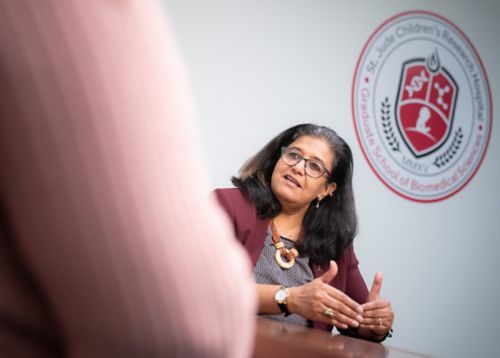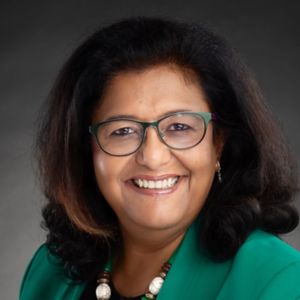St. Jude Family of Websites
Explore our cutting edge research, world-class patient care, career opportunities and more.
St. Jude Children's Research Hospital Home

- Fundraising
St. Jude Family of Websites
Explore our cutting edge research, world-class patient care, career opportunities and more.
St. Jude Children's Research Hospital Home

- Fundraising
How my global journey led to St. Jude

Shaloo Puri, MD, initially wanted to be an astronaut. Then she found a calling to be a doctor. Now, she gets to pursue another dream as assistant dean of the St. Jude Graduate School of Biomedical Sciences.
As a young girl growing up in India, I pointed my telescope deep into the New Delhi night sky and searched for distant worlds. I wanted to be an astronaut and view the Earth from miles above while floating through the cabin of a space shuttle.
Looking back, I realize that I didn’t have to become an astronaut to glimpse a rare view of our planet. I have been fortunate to experience the world through numerous pursuits.
My childhood experiences formed my ideas about how much needs to be done in the world. Epitomes of integrity, hard work and resilience, my parents set the example by opening their doors to the needy and disadvantaged. My brothers and I would gather our books and toys to share with children at a nearby orphanage. When our neighborhood was affected by a severe flood, I organized a door-to-door clothing and food drive to help those in need.
Throughout high school and early in college, with a desire to change the world, I wrestled with becoming a scientist or a physician. I chose medical school after two years of studying biochemistry. As a pulmonology resident, it was distressing to see helpless patients in the medical wards who struggled to catch their breath, but the hopeful faith that they and their families put in the hands of doctors inspired me to continue.
Most of India’s 1.3 billion people lack health insurance. They rely on overcrowded public hospitals and health care facilities or pay private providers out of pocket. Something didn’t seem right as I prescribed medicine to people who did not have food to eat. I will never forget the elderly man who questioned me with a pained smirk, when I asked him to buy a salbutamol inhaler, “Am I going to spend money on that or bread to feed my wife and children?”
I left my practice to gather my thoughts and consider other ways to help the larger problems in health care. After a brief hiatus, I went to work in a Delhi slum, where I started a school health program and ran a free outpatient clinic. I later joined the Voluntary Health Association of India, VHAI, where my role was part clinician, part program manager and part trainer. Traveling to remote rural areas to set up medical camps and explore the social and economic issues that affected health, I lived with families—eating meals offered by generous villagers and sleeping in tents, small homes and huts. Despite minimal resources, it was inspiring to see community members support each other.
During my time with VHAI, I also got the opportunity to lead disaster-relief efforts for the devastating1999 cyclone that killed 15,000 people in the Indian state of Odisha and a 7.7-magnitude earthquake that shook the state of Gujarat in western India in 2001. Our team witnessed a large influx of international aid but supplies often weren’t delivered where they were most needed. There was a lack of good policies, strategic programs and coordination among different sectors. We advocated for resources, coordinated efforts and worked with local government representatives. At nightly meetings, we reviewed the distribution of goods and services to ensure the delivery of food, tents, medicine and supplies.
Through these life-transforming experiences, I realized that it takes more than good intent and shouting slogans.
The Indian Ministry of Health encouraged me to apply to become a medical consultant with World Health Organization (WHO). I did so and served for 15 months, gaining a better understanding of some of the root causes of India’s health care issues. I was exposed to the global development sector including donor agencies and better understood the relationship among government, private health care providers, local and international non-governmental organizations (NGOs) and businesses. I learned to analyze and create policies and programs that looked beyond the individual.
I later joined the World Economic Forum in 2004 to lead multisectoral alliances that included government, international organizations, chambers of commerce and NGOs in India, China and South Africa. Working on innovative public-private partnerships to strengthen health systems and to enhance treatment and care of tuberculosis, HIV/AIDS and malaria, I learned more about the importance of good governance and leadership in agenda setting and decision making in global health.
Despite these successes, I sought more effective results. Seeking a fresh perspective, I decided to return to school to use academic reasoning to examine my real-world efforts.
At the Harvard T.H. Chan School of Public Health and the Kennedy School of Government, I examined in-depth how public-private partnerships affect health systems and was engaged in health sector reform initiatives for several countries. Later, Harvard asked me to direct their Doctor of Public Health program, which I did for three years before coming to St. Jude.
After learning about St. Jude’s vision for the future through conversations with Carlos Rodriguez-Galindo, MD, chair of Global Pediatric Medicine and director of St. Jude Global, I found a way to pursue another childhood dream: being an inventor. As assistant dean of the St. Jude Graduate School of Biomedical Sciences, I have spent the past year creating the School’s Master of Science in Global Child Health program.
The Tennessee Higher Education Commission approved the program in January 2019. I have been working with Graduate School Dean Stephen White, DPhil, faculty and staff and Global Pediatric Medicine colleagues to develop the curriculum and program policies. The program is open to all health care professionals and will focus on basic and applied research, health systems and population sciences, in addition to management and leadership skills. The courses will be online, with on-campus workshops and team projects. Students will write master’s theses, which will include project proposals that address child health issues and personal journey statements. Global Pediatric Medicine will consider select proposals for funding after degree completion.
Students who complete the two-year program will become agents of change, working to enhance treatment and care of pediatric cancer and other life-threatening diseases and positively impacting childhood health and wellness. The first class is expected to graduate in 2021. The 10 incredible students of the inaugural cohort traveled from around the globe to participate in the orientation and summer program from July 15 to August 9. The sessions focused on leadership, public speaking and writing skills. Many of the students called their month here an intensive and life-transforming experience.
This role brings together my experience, knowledge and skills and I am living my dreams through those students. St. Jude cannot be everywhere, but through transformative education, we can train people who can help those we need to reach, whether in rural Tennessee or India. The Master of Science program will empower others to travel with us through that last mile to reach more children and improve access to quality health care.






